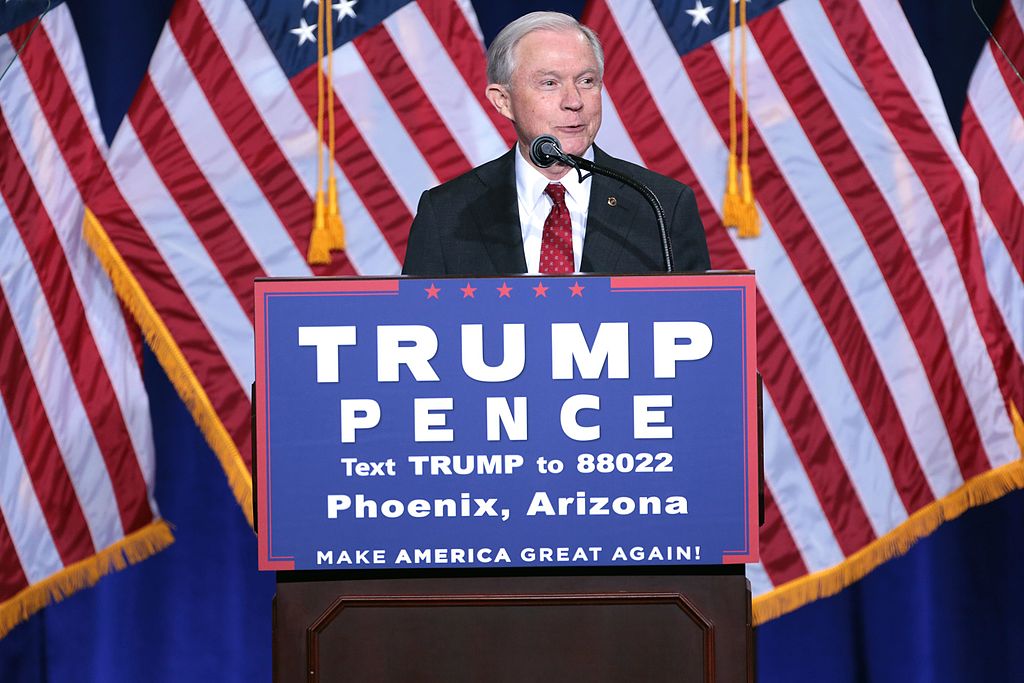Trump's Latest Attack on Jeff Sessions is Not 'Old News'
President Trump’s tweeted chastisement of Attorney General Jeff Sessions may pass quickly in and out of Wednesday’s news. For quite some time, he has made known his unhappiness with Sessions. The complaints began with the attorney general’s decision to comply with the Justice Department’s recusal regulations and give up supervision of the Russia investigation.

Published by The Lawfare Institute
in Cooperation With

President Trump’s tweeted chastisement of Attorney General Jeff Sessions may pass quickly in and out of Wednesday’s news. For quite some time, he has made known his unhappiness with Sessions. The complaints began with the attorney general’s decision to comply with the Justice Department’s recusal regulations and give up supervision of the Russia investigation. As he did again on Wednesday morning, Trump has assailed the attorney general for failing to investigate the Obama administration and Hillary Clinton for various alleged misdeeds. This most recent tweet was notably harsh in declaring it “DISGRACEFUL” that Sessions was referring to the inspector general, not to Justice Department prosecutors, alleged “abuse” of the FISA process to surveil Carter Page. But the basic story could seem like old news: a recriminatory president on Twitter, once more lashing out at his attorney general.
But it is not old news—far from it.
This time, Sessions abandoned his customary reserve in the face of presidential displeasure and issued a statement in his own defense. More significant than the act of self-defense was its substance. Here’s the “money quote”:
As long as I am the attorney general, I will continue to discharge my duties with integrity and honor, and this department will continue to do its work in a fair and impartial manner according to the law and Constitution.
It's worth pausing over its text and bringing out in clear terms an extraordinary judgment that no previous attorney general has ever—in all known American history—publicly pronounced on his president. Keeping in mind that this statement was not off-the-cuff—this is a prepared statement, after all, and issued when none was required—the attorney general is saying that:
- The president is criticizing Sessions for acting with “integrity and honor,”
- In apparent defiance of his president’s wishes, the attorney general plans to have the department “do its work in a fair and impartial manner according to the law and Constitution.”
- And—this is more in the nature of guesswork, but still plausible—Mr. Sessions may be implying that he is staying in this office as a first line of defense against the department succumbing to the improper pressures from this president.
Sessions did not offer more detail about his differences with the president. He left unclear what it is in the clash with the president that he believes bears directly on the “integrity and honor,” consistent with “the law and Constitution,” of his performance of his duties.
But it is not hard to surmise what he has in mind. During his confirmation hearings, he committed to his former colleagues that “The Office of the Attorney General of the United States is not a political position, and anyone who holds it must have total fidelity to the laws and the Constitution of the United States.” So he presumably is disturbed by Trump’s attempt to single out specific targets for criminal prosecution; to choose political opponents like Hillary Clinton as those targets; and to apply public pressure on the attorney general to comply with his expectations, at great risk to public confidence in the “fair and impartial” administration of justice in this government.
Maybe buried deep in our history is an episode like this, when an attorney general took public note of his president’s disregard of the ethical, legal and constitutional constraints on criminal law enforcement. None come to mind.
On the day that the Hope Hicks resignation fires up another round of speculation about the state of the White House, the Trump-Sessions conflict may have only a brief hold on the news cycle, but it will not be long forgotten. Special Counsel Robert Mueller has reportedly not missed the story. It will undoubtedly influence his evaluation of the president’s lawyers’ insistence that Trump had no corrupt intent—no thought of interfering with the fair and impartial administration of justice—when intervening on behalf of Michael Flynn or firing James Comey.
Sessions may have a chance to elaborate on his view that sometimes, to run a Justice Department that is faithful to “the law and Constitution,” he has had to ignore the express wishes of the president. It may come in a future congressional hearing—in the normal course of oversight or in an impeachment inquiry.





